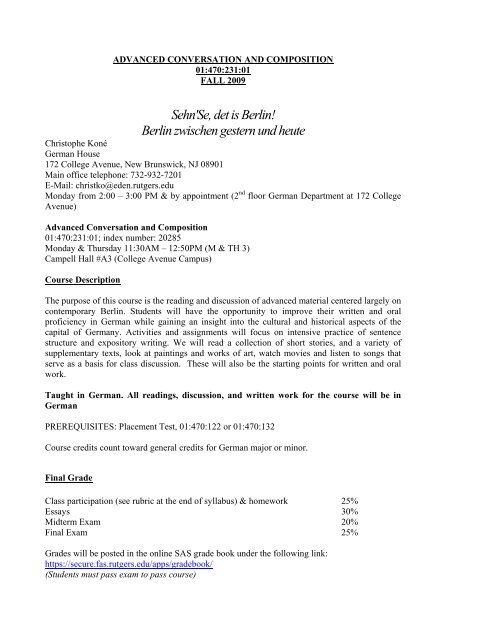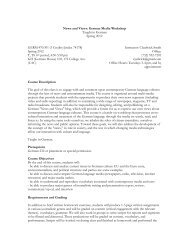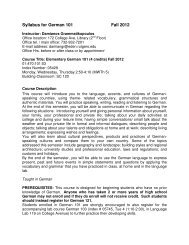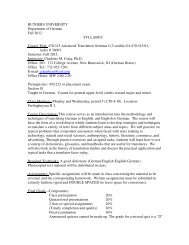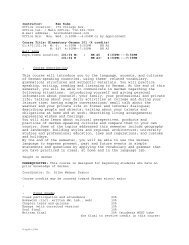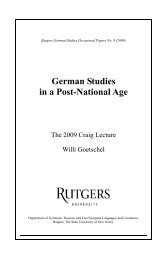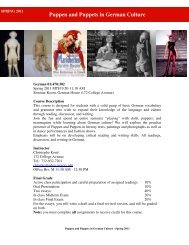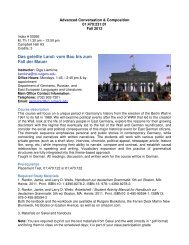Sehn'Se, det is Berlin! Berlin zwischen gestern und heute
Sehn'Se, det is Berlin! Berlin zwischen gestern und heute
Sehn'Se, det is Berlin! Berlin zwischen gestern und heute
You also want an ePaper? Increase the reach of your titles
YUMPU automatically turns print PDFs into web optimized ePapers that Google loves.
ADVANCED CONVERSATION AND COMPOSITION<br />
01:470:231:01<br />
FALL 2009<br />
<strong>Sehn'Se</strong>, <strong>det</strong> <strong>is</strong> <strong>Berlin</strong>!<br />
<strong>Berlin</strong> zw<strong>is</strong>chen <strong>gestern</strong> <strong>und</strong> <strong>heute</strong><br />
Chr<strong>is</strong>tophe Koné<br />
German House<br />
172 College Avenue, New Brunswick, NJ 08901<br />
Main office telephone: 732-932-7201<br />
E-Mail: chr<strong>is</strong>tko@eden.rutgers.edu<br />
Monday from 2:00 – 3:00 PM & by appointment (2 nd floor German Department at 172 College<br />
Avenue)<br />
Advanced Conversation and Composition<br />
01:470:231:01; index number: 20285<br />
Monday & Thursday 11:30AM – 12:50PM (M & TH 3)<br />
Campell Hall #A3 (College Avenue Campus)<br />
Course Description<br />
The purpose of th<strong>is</strong> course <strong>is</strong> the reading and d<strong>is</strong>cussion of advanced material centered largely on<br />
contemporary <strong>Berlin</strong>. Students will have the opportunity to improve their written and oral<br />
proficiency in German while gaining an insight into the cultural and h<strong>is</strong>torical aspects of the<br />
capital of Germany. Activities and assignments will focus on intensive practice of sentence<br />
structure and expository writing. We will read a collection of short stories, and a variety of<br />
supplementary texts, look at paintings and works of art, watch movies and l<strong>is</strong>ten to songs that<br />
serve as a bas<strong>is</strong> for class d<strong>is</strong>cussion. These will also be the starting points for written and oral<br />
work.<br />
Taught in German. All readings, d<strong>is</strong>cussion, and written work for the course will be in<br />
German<br />
PREREQUISITES: Placement Test, 01:470:122 or 01:470:132<br />
Course credits count toward general credits for German major or minor.<br />
Final Grade<br />
Class participation (see rubric at the end of syllabus) & homework 25%<br />
Essays 30%<br />
Midterm Exam 20%<br />
Final Exam 25%<br />
Grades will be posted in the online SAS grade book <strong>und</strong>er the following link:<br />
https://secure.fas.rutgers.edu/apps/gradebook/<br />
(Students must pass exam to pass course)
The instructor reserves the right to make changes to the percentages.<br />
Course grades as follows:<br />
A=90-100%; B+=85-89%; B=80-84%; C+=75=79; C=70-74; D=66-69; F=65 and below<br />
Required Texts – available at the Rutgers Bookstore in the Ferren Deck Mall in New Brunswick<br />
(across from train station) and on Amazon.com<br />
Required<br />
Handbuch zur deutschen Grammatik 4 th edition (textbook) by Rankin & Wells<br />
ISBN-10 # 0618338128<br />
ISBN-13 # 978-0618338122<br />
Russend<strong>is</strong>ko by Wladimir Kaminer<br />
ISBN-10 # 3442541751<br />
ISBN-13 # 978-3442541751<br />
I would also recommend that you invest in a soft-cover German-Engl<strong>is</strong>h/Engl<strong>is</strong>h-German<br />
dictionary.<br />
Attendance<br />
All students must attend regularly and arrive prepared. Those who m<strong>is</strong>s more than two class<br />
sessions of all 28 without a compelling excuse (a doctor’s or college dean’s note, for instance)<br />
should expect a one-step reduction in the course grade (i.e. an A becomes a B+, a B+ becomes a<br />
B). Absences for reasons of religious obligation are excused, however, students are adv<strong>is</strong>ed to<br />
provide timely notification to instructors about necessary absences for religious observances and<br />
are responsible for making up the work or exams according to an agreed-upon schedule. Three<br />
late arrivals (everything over 10 min) count as one absence. Note: In any case it <strong>is</strong> the<br />
responsibility of students who have been absent (for any reason) to find out what they have<br />
m<strong>is</strong>sed and obtain materials that may have been handed out.<br />
German Conversation Group<br />
Since th<strong>is</strong> class focuses on advanced conversation, students are strongly encouraged to regularly<br />
attend the German Conversation Group offered by the Language Laboratory (time and location<br />
TBA). Note that the participation in three German Conversation Group sessions in a row will<br />
cancel one class absence.<br />
Plagiar<strong>is</strong>m<br />
Plagiar<strong>is</strong>m <strong>is</strong> an extremely serious matter, and can lead to a student’s failing the course and being<br />
referred to h<strong>is</strong> or her dean for d<strong>is</strong>ciplinary action. When referring to ideas other than your own,<br />
always acknowledge your sources clearly and completely, whether you are quoting or<br />
paraphrasing. Please see the University’s policies on academic integrity at<br />
http://teachx.rutgers.edu/integrity/policy.html,<br />
and d<strong>is</strong>cuss with your instructor any questions you may have about th<strong>is</strong> and related <strong>is</strong>sues.
Photocopies<br />
Department photocopying fees add up quickly and impressively; we will therefore need to<br />
collect from each student 5 cents per page toward the cost of handouts other than the syllabus,<br />
quizzes and tests.<br />
Class Website<br />
You can find a website for the course <strong>und</strong>er the following link: http://sakai.rutgers.edu. You<br />
should be enrolled and have access automatically if you are a reg<strong>is</strong>tered Rutgers student and<br />
have signed up for the class. Just use your NetID and password. If not, then please contact me<br />
and I will give you access. Please check the website frequently for the most recent<br />
announcements, worksheets and assignments, or to chat with fellow classmates.<br />
Homework<br />
Homework:<br />
Homework <strong>is</strong> due on the date noted in the syllabus.<br />
All readings are due on the day that they are to be talked about in class.<br />
We will be covering the first half of Handbuch zur deutschen Grammatik th<strong>is</strong> semester in order<br />
to review all the basic points of German grammar and uncover any problem spots. Reading<br />
the lessons carefully, preparing any required exerc<strong>is</strong>es from the book, and coming prepared<br />
with any questions all count toward your class participation.<br />
Class participation:<br />
All students are expected to take part actively in class d<strong>is</strong>cussion. To th<strong>is</strong> end, you are expected<br />
to bring with you to each class three written questions that you think would contribute to a<br />
productive d<strong>is</strong>cussion and deepen your <strong>und</strong>erstanding of the text at hand.<br />
Other texts and any audio materials will posted on Sakai in a timely manner or d<strong>is</strong>tributed in<br />
class.<br />
SITZUNG DATUM KURS KAPITEL/THEMA HAUSAUFGABEN<br />
1 3.09. Introduction: schedule, expectations,<br />
course backgro<strong>und</strong> information<br />
2 8.09.<br />
(note<br />
change)<br />
Introduction of class mates<br />
BERLIN IN DER WEIMARER REPUBLIK<br />
Film: Walther Ruttman, <strong>Berlin</strong>, die<br />
Sinfonie der Großstadt, 1927<br />
3 10.09. Gedicht: Kurt Tucholsky, „Augen in der<br />
Großstadt“, 1932<br />
4 14.09. Gedicht: Erich Kästner, „Besuch vom<br />
Lande“<br />
Bild: Ernst Ludwig Kirschner<br />
„Potsdamer Platz“, 1914<br />
5 17.09. Kabarett Lieder: Friedrich Hollaender,<br />
„Ich weiß nicht zu wem ich gehöre“,<br />
1932<br />
M<strong>is</strong>cha Spoliansky, „Maskulinum –<br />
Femininum“<br />
Kapitel 1 – Word order S. 9/ A, B<br />
Kapitel 2 – Present<br />
Tense<br />
S. 10/ C, D<br />
S. 11 Schriftliche<br />
Themen<br />
S. 21/ A, B, C, D
6 21.09. Bild: Otto Dix, „Metropol<strong>is</strong>“ 1928 Kapitel 3 – Present<br />
Perfect Tense<br />
7 24.09. Kabarett Lieder Friedrich Hollaender,<br />
„Gesetz den Fall“, 1928<br />
M<strong>is</strong>cha Spoliansky, „Das lila Lied“<br />
8 28.09. DAS NAZI BERLIN<br />
Gedicht: Max Herrmann-Ne<strong>is</strong>se,<br />
„Kassandra seit 1933“<br />
9 1.10. BERLIN IN TRÜMMERN<br />
Film: Wolfgang Staudte, Die Mörder<br />
sind unter uns, 1946<br />
10 5.10. Erzählung: El<strong>is</strong>abeth Langgässer,<br />
„Glück haben“<br />
11 8.10. DAS GETEILTE BERLIN<br />
Erzählung: Thomas Brasch, “Fliegen im<br />
Gesicht” aus Vor den Vätern sterben die<br />
Söhne, 1977<br />
12 12.10. Roman: Thomas Brussig, Am kürzeren<br />
Ende der Sonnenallee, 1999 „Churchills<br />
kalter Stumpen“<br />
13 15.10. Roman: Thomas Brussig, Am kürzeren<br />
Ende der Sonnenallee, 1999 „Die<br />
Verdonnerten“<br />
14 19.10. Roman: Thomas Brussig, Am kürzeren<br />
Ende der Sonnenallee, 1999<br />
„Unterwandern: So, so oder so“<br />
15 22.10. Roman: Thomas Brussig, Am kürzeren<br />
Ende der Sonnenallee, 1999 „Wie<br />
Deutschland nicht gevierteilt wurde“<br />
Kapitel 4 – Cases and<br />
Declensions<br />
Kapitel 5 – Articles and<br />
Possessive Adjectives<br />
Kapitel 6 – Negation<br />
and Imperatives<br />
Kapitel 7 – Simple Past<br />
and Past Perfect Tense<br />
16 26.10. MIDTERM EXAM<br />
17 29.10. MIGRANTEN-BERLIN<br />
Erzählungsband: Wladimir Kaminer,<br />
Russend<strong>is</strong>ko, 2000, „Russen in <strong>Berlin</strong>,“<br />
„Vaters Rat,“ „Die erste eigene<br />
Wohnung“ <strong>und</strong> „Der türk<strong>is</strong>che Kater“<br />
18 2.11. Erzählungsband: Wladimir Kaminer,<br />
Russend<strong>is</strong>ko, 2000, „Russend<strong>is</strong>ko,“<br />
„Warum ich immer noch keinen Antrag<br />
auf Einbürgerung gestellt habe,“ „Der<br />
Sprachtest“ <strong>und</strong> „Mein Vater“<br />
19 5.11. Erzählungsband: Wladimir Kaminer,<br />
Russend<strong>is</strong>ko, 2000, „Fähnrichs Heirat,“<br />
„Beziehungsk<strong>is</strong>te <strong>Berlin</strong>“ <strong>und</strong> „Die<br />
russ<strong>is</strong>che Braut,“ „Nur die Liebe sprengt<br />
die Welt“ <strong>und</strong> „Spring aus dem Fenster“<br />
20 9.11. Erzählungsband: Wladimir Kaminer,<br />
Russend<strong>is</strong>ko, 2000, „Russend<strong>is</strong>ko“ 2000<br />
„Geschäftstarnungen,“ „Der Professor,“<br />
Kapitel 8 – Future<br />
Tense and Future<br />
Perfect Tense<br />
Kapitel 9 – Modal<br />
Verbs<br />
S. 22/ E, F, G<br />
Erster Aufsatz zu<br />
„<strong>Berlin</strong> in der<br />
Weimarer Republik“<br />
– Rough Draft<br />
S. 36/ A, B, E, F<br />
Erster Aufsatz – Final<br />
Draft<br />
S. 54/ D, E, F, G<br />
S. 70/ A, C, D, F<br />
S. 81/ A, D, E, F, G<br />
S. 94/ A, B, D,<br />
S. 95/ E<br />
S. 98/ A<br />
S. 106/ B, C<br />
S. 107/ D<br />
S. 122/ A, C, D<br />
Zweiter Aufsatz zu<br />
„Migranten <strong>Berlin</strong>“ –
21 12.11.<br />
„Russenmafiapuff,“ <strong>und</strong> „Bahnhof<br />
Lichtenberg“<br />
TÜRKEN IN BERLIN<br />
Erzählung: Emine Sevgi Özdamar,<br />
„Mein <strong>Berlin</strong>“ aus Der Hof im Spiegel,<br />
2001<br />
22 16.11. Erzählung: Emine Sevgi Özdamar, „Ul<strong>is</strong><br />
Weinen“ aus Der Hof im Spiegel, 2001<br />
Kapitel 10 –<br />
Prepositions<br />
Rough Draft<br />
S. 123/ F, G<br />
S. 126/ A<br />
Zweiter Aufsatz –<br />
Final Draft<br />
23 19.11. Film: Detlev Buck, Knallhart, 2006 S. 143/ A, C, D<br />
24 23.11. DAS MULTI KULTI BERLIN Kapitel 11 –<br />
S. 144/ F, H, I, J<br />
Text: May Ayim, “Deutch-deutsch<br />
Vaterland”<br />
Conjunctions<br />
25 24.11. BERLINER CLUBKULTUR<br />
S. 164/ B, C, D<br />
(note Songs: Ellen Alien „Stadtkind“, 2001,<br />
change „Alles sehen“, 2003<br />
of day) Dokumentarfilm: The Other Side: <strong>Berlin</strong><br />
with Ellen Alien, 2007<br />
26 30.11. Song: Peter Fox „Schwarz zu Blau“ Kapitel 12 – Noun S. 164/ E, F<br />
2009<br />
Genders, Noun Plurals S. 168/ B<br />
Song: Seed „Dickes B“ 2001<br />
and Weak Nouns<br />
27 3.12. Film: Hannes Stöhr, <strong>Berlin</strong> Calling,<br />
S. 180/ A, B, F<br />
2008<br />
Dritter Aufsatz zu<br />
<strong>Berlin</strong>er Clubkultur“<br />
– Rough Draft<br />
28 7.12. Rückblick <strong>und</strong> Kurszusammenfassung Kapitel 13 - Adjectives S. 196/ A, B, D, G, H<br />
S. 202/ C<br />
29 10.12 Themat<strong>is</strong>che <strong>und</strong> grammatikal<strong>is</strong>che<br />
Wiederholung<br />
21.12. FINAL EXAM 12-3PM<br />
Exceeds expectations<br />
(100-90 %)<br />
Attentiveness Student <strong>is</strong> always<br />
attentive.<br />
Contribution Student <strong>is</strong> always eager<br />
to contribute to class,<br />
pair and group work and<br />
ask questions. Students<br />
always volunteers<br />
answers.<br />
R<strong>is</strong>k Taking Student only speaks<br />
German during class.<br />
CLASS PARTICIPATION RUBRIC<br />
Meets expectations<br />
(89-80 %)<br />
Student <strong>is</strong> attentive most<br />
of the time.<br />
Student <strong>is</strong> eager to<br />
contribute to class, pair<br />
and group work and<br />
occasionally asks<br />
questions. Student<br />
volunteers answers most<br />
of the time.<br />
Student tries to only<br />
speak German during<br />
class<br />
Meets some expectations<br />
(79-70 %)<br />
Student <strong>is</strong> sometimes<br />
attentive.<br />
Student <strong>is</strong> occasionally<br />
eager to contribute to<br />
class, pair and group<br />
work and asks questions<br />
some of the time. Student<br />
volunteers answers some<br />
of the time.<br />
Student speaks German<br />
most of the time during<br />
class, but still switches to<br />
Engl<strong>is</strong>h frequently.<br />
Dritter Aufsatz –<br />
Final Draft<br />
Below expectations<br />
(69-65 %)<br />
Student <strong>is</strong> barely<br />
attentive.<br />
Student almost never<br />
contributes to class, pair<br />
and group work, never<br />
asks questions and<br />
volunteers answers.<br />
Student speaks German<br />
some of the time during<br />
class, but prefers to spea<br />
Engl<strong>is</strong>h.


